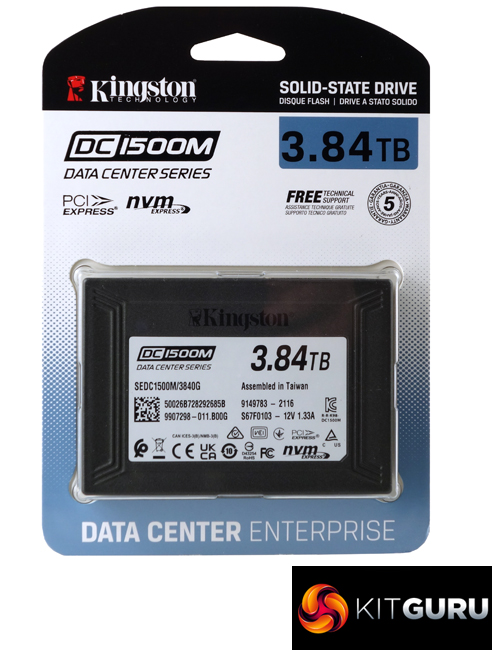Designed as a replacement for the DC1000M (review here), the DC1500M features the same Silicon Motion SMI 2270 16-channel controller as the previous drive (but with updated firmware) and marries it up with BiCS4 96-Layer 3D TLC NAND instead of the DC1000M's BiCS3 64-layer NAND. The drive implements Kingston’s QoS (Quality of Service) requirements to ensure predictable random I/O performance and low latencies over a wide range of read and write data centre centric workloads.
The drive uses a U.2 (PCIe NVMe Gen3 x4) interface which is hot-pluggable and compatible with U.2 backplanes of storage systems and enterprise servers.
 As you might expect for a data centre/enterprise focussed drive, the DC1500M comes with a host of features aimed at this market segment; reliability and usage statistics tracking, hardware power loss protection (PLP), telemetry monitoring, end-to-end data path protection and multiple namespace management. Talking of namespace management, the DC1500M may use the same controller as its predecessor, but the firmware has been updated so the drive now supports up 64 namespaces, a very useful addition for VM management.
As you might expect for a data centre/enterprise focussed drive, the DC1500M comes with a host of features aimed at this market segment; reliability and usage statistics tracking, hardware power loss protection (PLP), telemetry monitoring, end-to-end data path protection and multiple namespace management. Talking of namespace management, the DC1500M may use the same controller as its predecessor, but the firmware has been updated so the drive now supports up 64 namespaces, a very useful addition for VM management.
Kingston quotes Sequential read/write figures for the 3.84TB DC1500M as up to 3,100MB/s and 2,700MB/s for read and writes respectively. Incidentally, that read figure is the same for three out of the four drives, the 960GB, 3.84TB and 7.68TB. The odd man out is the 1.92TB drive which is the fastest at up to 3,300MB/s. The 1.92TB and 7.68TB have the same 2,700MB/s write rating as the 3,84TB drive with 960GB model down at 1,700MB/s.
We confirmed both official figures with our own Sequential tests using a single thread with a peak read test result of 3,485MB/s with writes peaking at 2,855MB/s. Using four threads we got a best read result of 3,480MB/s with writes at 2,881MB/s.
Random 4K performance for the 3.842TB drive is quoted as up to 480,000 IOPS for reads and up to 210,000 IOPS for writes with the drive in a steady-state. We tested the drive FOB using our standard 4-threaded tests and got a peak read figure of 454,358 IOPS (QD128). When it came to random write performance, the best we saw was 229,483 IOPS (QD128).
Power-wise the DC1500M is a little hungrier than the previous 3.84TB DC1000M for reads; 6.80W idle (5.54W DC1000M), 6.40W for average reads rising to 6.63W maximum (5.31W and 6.10W maximum for the DC1000M). Average writes on the other hand see the latest drive being a bit more frugal than the DC1000M, averaging 14.20W as opposed to14.69W however, when it comes to maximum writes it swings back in favour of the older drive; 16W versus 15.5W.
Kingston has given the 3.84TB DC1500M an endurance rating of 1 DWPD (Drive Writes Per Day) over the length of the 5-year warranty Kingston backs the drive with.
You can buy the 3.84TB version of the DC1500M on Insight for £718.79 (inc VAT) HERE.
Pros
- Overall Performance.
- Multiple Namespace support.
- Endurance.
Cons
- Pricey.
KitGuru says: Kingston's DC1500M isn't a leap forward from the previous DC1000M but more of a technology refresh with the move from 64-layer to 96-layer NAND and the addition of support for 64 namespaces while retaining features such as hardware power protection and end to end data protection.
 KitGuru KitGuru.net – Tech News | Hardware News | Hardware Reviews | IOS | Mobile | Gaming | Graphics Cards
KitGuru KitGuru.net – Tech News | Hardware News | Hardware Reviews | IOS | Mobile | Gaming | Graphics Cards



